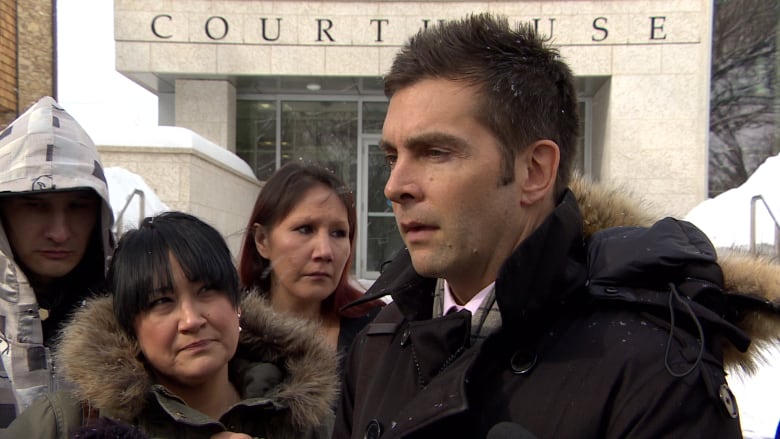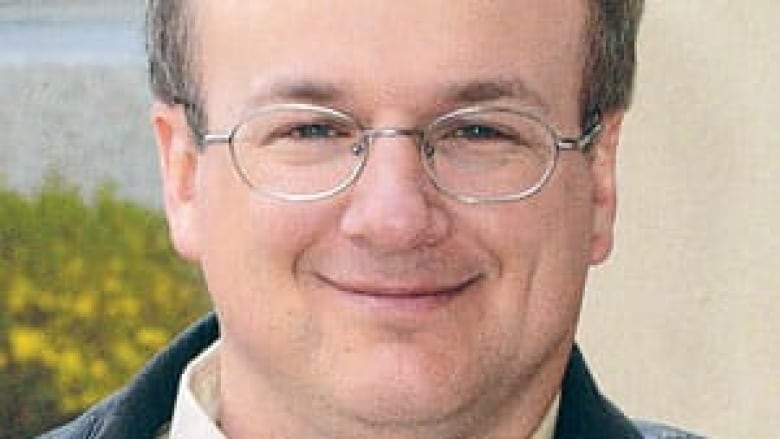Sask. coroner's inquests could provide model for Indigenous jury reform: lawyers
Gerald Stanley trial raised concerns about Indigenous representation on juries

The lawyer for Colten Boushie's family says an experience inside a different Saskatchewan courtroom this week gave him an idea about how Canada's jury system could be reformed.
Chris Murphy represented the Boushie family at a trial in Battleford, Sask. last month, in which Gerald Stanley was acquitted of second-degree murder in the shooting death of 22-year-old Colten Boushie.
Murphy is also representing the family of Jordan Lafond, whose death is the focus of a coroner's inquest in Saskatoon.
Lafond died after a stolen truck he was riding in crashed and the family has questions about the police involvement in his death.
While that inquest was delayed until June, jury selection took place this week in Saskatoon.
Murphy said the jury selection process at that inquest caught his attention — especially given his concerns about the way the jury selection was carried out in the Stanley trial.
Murphy said all the visibly-Indigenous prospective jurors were left off the Stanley jury. CBC cannot independently confirm whether or not any Indigenous people were on the 12-person jury that acquitted Stanley.

The system at the Lafond inquest ensured that at least half of the jurors were Indigenous — something Murphy said could be adopted to make the jury system more representative at criminal trials.
"I walked out of the Gerald Stanley process firmly believing that the system had to change," said Murphy.
"And I walked out of the jury selection process [at the Lafond inquest this week] believing that a very fair process had just occurred."
Sask. coroner has the right to insist jury half Indigenous
In that inquest, the coroner made it clear he wanted at least half of the inquest jury to be Indigenous. Under the province's Coroner's Act, the coroner has the right to ensure there was a separate, randomly-selected pool of Status First Nations jurors to select from, as well as another separate pool from the general public.
You can't ignore the differences between the criminal system and a coroner's inquest.- Drew Lafond, lawyer and vice-president of the Indigenous Bar Association
The jury of six people ended up having four self-identified Indigenous people.
"We arrived at what everyone walking out of that room would agree was an impartial jury. I don't see the downside to it," Murphy said.
Kent Roach, a law professor and expert in law and public policy at University of Toronto, said Saskatchewan's inquest system may have something to offer the criminal system — especially as experts look at ways to get more Indigenous people involved in the jury process.
"The criminal justice system has to realize that we can learn from the experience of the coroner's system, and it may be that [is] something like the Saskatchewan coroner's system being adopted in the criminal system," Roach said.
Jurors questioned for bias by coroner, not lawyers

Roach said that's a good model, and those kinds of questions were never asked at the Stanley trial by the judge or even the lawyers.
"There can be a public interest in having Indigenous representation on juries, but there is never a public interest in having biased jurors or jurors that will be partial," he said.
Lawyer highlights differences between inquest and criminal trials
Drew Lafond, a Calgary-based lawyer who is from Muskeg Lake Cree Nation and is the Vice President of the Indigenous Bar Association, said it may be easier said than done to translate the coroner system into a criminal trial.
"It's certainly something that Sask. has done to be more proactive," he said. "(But) you can't ignore the differences between the criminal system and a coroner's inquest."
Unlike criminal trials, coroner's inquests are fact-finding, not fault-finding. No one is charged criminally in an inquest and they often result in non-binding and preventative recommendations. Criminal trials, of course, result in convictions or acquittals.
Lafond said he's waiting to learn the results of two separate reports on Indigenous representation in the justice system.
Some change underway
The Ontario government commissioned former justice Frank Iacobucci in 2011 to look into why Indigenous people aren't properly represented on juries in the province.
A committee has been struck and is looking into the recommendations of that report, and they are understood to be preparing their own report for that province's attorney general.
Lafond also said the Aboriginal Justice Inquiry in Manitoba offers insights into how to make the system more representative, and the federal government is looking into broad sweeping changes to the Criminal Code. There's indication those changes could include jury reform.
But Lafond said any change will not only have to come from the courts, but also First Nations communities themselves.
"You need to start working more collaboratively with First Nations," Lafond said.

